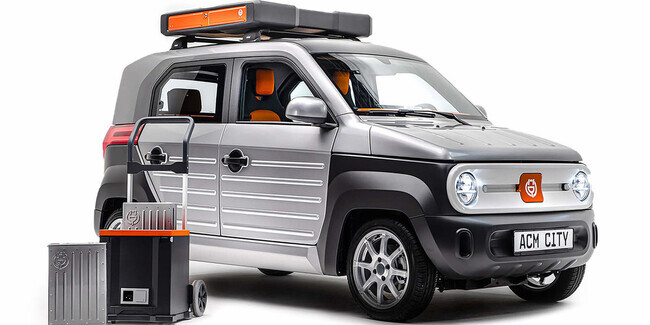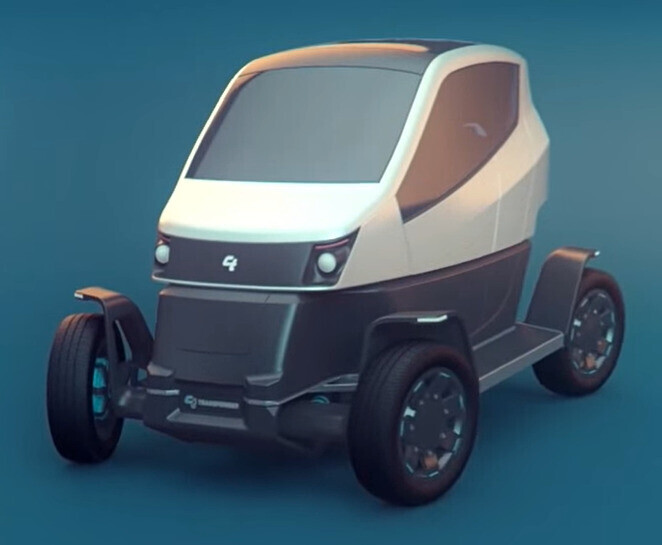hankyoreh
Links to other country sites 다른 나라 사이트 링크
Electric vehicles take main stage at international auto show

The motor show that once displayed the fastest and most powerful automobiles has a new look. It’s now a venue for automakers to display electric vehicles and other eco-friendly means of transportation as they respond to the climate crisis and tougher environmental regulations.
South Korea’s Hyundai Motor has joined the ranks of companies planning to stop selling cars with internal combustion engines in Europe by 2035.
The International Motor Show (in German, Internationale Automobil Austellung, or IAA) starts on Tuesday in Munich, Germany, with the name “Mobility 2021.”
The IAA, which had been held in Frankfurt since 1951, is one of the world’s most famous motor shows. With the show being held offline for the first time since the outbreak of COVID-19, the organizers decided to relocate it to Munich, a hub of the IT industry. They’ve also expanded the show to include all means of transportation, including bicycles and electric scooters.
The show is being organized by the German Automotive Industry Association. “The theme of this show is digital connectivity between transportation and climate-friendly engines,” said Hildegard Mueller, the association’s president, during a press conference.
Mueller said the show is no longer an industry event for vehicles with internal combustion engines, which emit carbon dioxide, but has become an exhibition for futuristic means of transportation with the goal of protecting the climate.
In line with that goal, the show is exhibiting a great variety of new eco-friendly electric vehicles and related technology.
The City One, manufactured by Munich-based Adaptive City Mobility (ACM), is a low-cost electric vehicle that’s battery can be switched out in three minutes. Only 3.6 meters long, this vehicle can carry up to four people. When the car’s battery runs low, it can be replaced by four supplemental batteries with a capacity of 2.5 kilowatt hours that give the vehicle a maximum distance of 240 kilometers.
Canadian firm Magna International, which recently set up a joint venture for electric vehicle parts with LG Electronics, has been contracted to manufacture the City One. ACM plans to start selling the vehicle for US$11,000-$18,000 within the next few years.
A folding car released by City Transformer, a new Israeli company, can contract by as much as 40 centimeters on both sides to help the vehicle squeeze through traffic or into cramped parking spaces.
Established automakers are also competing to release new electric vehicles. BMW, which is also based in Munich, is displaying recycling technology aimed at minimizing resource consumption sticking with its circular economy commitments. The company has rolled out the iX, an electric SUV, and the i4, an electric sedan.
Mercedes-Benz is unveiling its new EQE, a completely electric sedan, and its EQG concept car, an electric G-Class off-road vehicle. These support the automaker’s goal of playing a leading role in the future of electric cars.
American automaker Ford is showcasing its Mustang Mach-E GT, while France’s Renault Group is highlighting its Megane E-Tech Electric, its first electric SUV.
Hyundai Motor has also announced it will be expanding operations in the electric vehicle market.

“Climate change is an undeniable challenge that needs everyone’s utmost and urgent attention. Hyundai Motor commits to become carbon neutral in its global products and operations by 2045,” said Chang Jae-hoon, the automaker’s president and CEO, in a presentation in Munich on Monday.
Hyundai has agreed to stop selling cars with internal combustion engines and only sell fully electric vehicles in Europe starting in 2035. The European Commission plans to ban sales of cars with internal combustion engines by then, prompting the company to accelerate its timetable by five years.
Hyundai will also focus on electric vehicle sales in other major markets by 2040, by which point it expects that electric vehicles will make up 80 percent of all its car sales.
Another futuristic technology — self-driving cars — are a big focus at the IAA.
“The real game changer is software and autonomous driving,” Reuters quoted Volkswagen CEO Herbert Diess as saying on Sunday, shortly before the car show opened.
Germany’s Volkswagen Group, Europe’s largest automaker, is a major investor in Argo AI, an American startup that specializes in autonomous driving technology.
Self-driving technology also fuels the Ioniq 5 electric robotaxi, which Hyundai Motor displayed for the first time at the IAA.
Some have accused the IAA of letting automakers engage in “greenwashing,” or making misleading claims about their environmental impact.
Greenpeace and German environmental groups have criticized automakers for talking up their eco-friendly practices even as cars with internal combustion engines still make up most of their sales.
By Park Jong-o, staff reporter
Please direct questions or comments to [english@hani.co.kr]

Editorial・opinion
![[Column] Season 2 of special prosecutor probe may be coming to Korea soon [Column] Season 2 of special prosecutor probe may be coming to Korea soon](https://flexible.img.hani.co.kr/flexible/normal/500/300/imgdb/original/2024/0426/3317141030699447.jpg) [Column] Season 2 of special prosecutor probe may be coming to Korea soon
[Column] Season 2 of special prosecutor probe may be coming to Korea soon![[Column] Park Geun-hye déjà vu in Yoon Suk-yeol [Column] Park Geun-hye déjà vu in Yoon Suk-yeol](https://flexible.img.hani.co.kr/flexible/normal/500/300/imgdb/original/2024/0424/651713945113788.jpg) [Column] Park Geun-hye déjà vu in Yoon Suk-yeol
[Column] Park Geun-hye déjà vu in Yoon Suk-yeol- [Editorial] New weight of N. Korea’s nuclear threats makes dialogue all the more urgent
- [Guest essay] The real reason Korea’s new right wants to dub Rhee a founding father
- [Column] ‘Choson’: Is it time we start referring to N. Korea in its own terms?
- [Editorial] Japan’s rewriting of history with Korea has gone too far
- [Column] The president’s questionable capacity for dialogue
- [Column] Are chaebol firms just pizza pies for families to divvy up as they please?
- [Column] Has Korea, too, crossed the Rubicon on China?
- [Correspondent’s column] In Japan’s alliance with US, echoes of its past alliances with UK
Most viewed articles
- 1After election rout, Yoon’s left with 3 choices for dealing with the opposition
- 2Two factors that’ll decide if Korea’s economy keeps on its upward trend
- 3Why Kim Jong-un is scrapping the term ‘Day of the Sun’ and toning down fanfare for predecessors
- 4Noting shared ‘values,’ Korea hints at passport-free travel with Japan
- 5AI is catching up with humans at a ‘shocking’ rate
- 6South Korea officially an aged society just 17 years after becoming aging society
- 7Korea’s 1.3% growth in Q1 signals ‘textbook’ return to growth, says government
- 8‘We must say no’: Seoul defense chief on Korean, USFK involvement in hypothetical Taiwan crisis
- 9Exchange rate, oil prices, inflation: Can Korea overcome an economic triple whammy?
- 10Japan officially says compensation of Korean forced laborers isn’t its responsibility